
Tracking SDG7 Report Finds Energy Access
Has Improved, But Financial Support Still Needed
to Boost Progress and Address Disparities
Almost 92% of the world’s population now has basic access to electricity, according to the latest data released in Tracking SDG 7: The Energy Progress Report 2025, at a virtual briefing on 25 June. While this is an improvement, 666.4 million people remain without access, with the current rate insufficient to reach the target of universal access by 2030. Calling for urgent action to meet basic energy needs, the report also stresses that continued global progress on renewable energy and energy efficiency are key to achieve both sustainable development and climate goals. The report is prepared annually by the five "custodian" agencies that monitor data on Sustainable Development Goal 7 -- IEA, IRENA, UN Statistics Division, World Bank and WHO.
To accelerate access, the report urges targeted finance to boost the role of distributed renewable energy (a combination of mini-grid and off-grid solar systems), since the population remaining unconnected lives mostly in remote, lower-income areas. Cost-effective and rapidly scalable, decentralised solutions are able to reach communities in such rural areas, to increase access to both electricity and clean cooking. With an estimated 1.5 billion people residing in rural areas still lacking access to clean cooking, the use of off-grid clean technologies, such as household biogas plants and mini-grids that facilitate electric cooking, can provide solutions that reduce health impacts caused by household air pollution.
Notable progress was made on other indicators. International financial flows to developing countries in support of clean energy grew for a third year in a row to reach USD 21.6 billion in 2023. Installed renewables capacity per capita continued to increase year-on-year to reach a new high of 341 watts per capita in developing countries, up from 155 watts in 2015.
Yet regional disparities persist, indicating that particular support is needed for developing regions. Eighty-five percent of the global population without electricity access reside in Sub-Saharan Africa, while the number of people without access to clean cooking there continues to grow at a rate of 14 million people yearly. Renewables deployment in the region has rapidly expanded but remains limited to 40 watts of installed capacity per capita on average.

